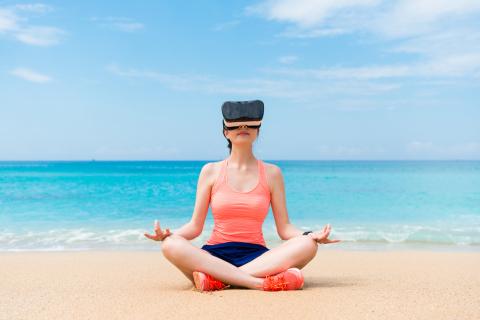
Tourism operators should be using virtual reality and augmented reality technology to entice COVID-weary Chinese tourists back to Australia, a new study suggests.
China shut its borders and ended international travel by its citizens almost three years ago in response to the pandemic.
The country quickly lost its mantle as the world's leading source of international visitors, upending the business models of destinations worldwide.
China lifted restrictions on foreign travel this year but there has been little bounce-back, with Austrade predicting visitor arrivals from China will not return to pre-pandemic levels until 2026.
Ahmad Siddiquei, Assistant Professor of Management at Bond University, worked with fellow researchers in China to investigate why its citizens were reluctant to venture abroad and what could be done to reverse the trend.
The study surveyed 1308 Chinese consumers of immersive media during the third quarter of 2022.
Dr Siddiquei said information overload and health-related factors were affecting Chinese outbound travel.
“Excessive information-seeking behaviour over social media about COVID leads to avoidance of international travel,” Dr Siddiquei said.
“Our study suggested that would-be travellers are concerned about the outbreak of a new pandemic in destination countries and are mindful of the COVID situation within China.”
Rumours about the state of international relations between China and the US, and China and Australia, were also affecting people's international travel choices.
However, Dr Siddiquei said two factors moderated Chinese people’s travel fears.
One was information literacy and their ability to seek out the truth.
The other was their attitude toward digital tourism and the use of VR and AR to explore foreign destinations.
“As the Chinese AR and VR market is expected to grow by 43.8 percent from 2022 to 2026, we believe this is where the opportunity lies,” Dr Siddiquei said.
“Prominent tourist destinations like Australia should be using VR or any immersive media to get the attention of Chinese tourists.
“This allows potential tourists to experience our unique local attractions while sitting in the comfort of their homes.”
Dr Siddiquei said immersive technologies such as VR and AR were playing an increasingly crucial role in the customer buying cycle in tourism.
“Once they experience a destination virtually, it builds their interest and reduces their fears. We can entice them out of cyberspace and into a real-world international holiday,” Dr Siddiquei said.
"Virtual reality is as close to reality as you can get but at the end of the day, you want to go and experience a destination in person."